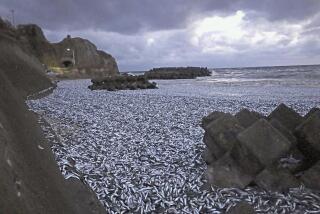Fishing Frenzy Spreads During South Africa’s Sardine Run
PARK RYNIE, South Africa — Barefoot and dressed in an enveloping black burka, Fatima Dawood wades excitedly into the shallow waters of the Indian Ocean. She crouches and snatches at the silvery surf, hoping to grasp a few of the slippery fish twirling in the sand below.
Her strategy pays off. She is soon fumbling with a handful of agitated sardines.
“It’s very exciting,” says Dawood, 50, whose husband and two young grandsons joined her one recent morning to snap up scores of the small fish on a beach near Park Rynie, about 50 miles south of Durban. “We clean them, put some spices on them and freeze them. As we want them, we fry them and eat them.”
The Dawoods are among thousands of residents and tourists along South Africa’s eastern coast who catch “sardine fever” every year when millions of the small fish make their way north to cooler, inshore waters, unintentionally beaching at junctures along the way.
This natural phenomenon takes place between late May and the end of July every year on the same stretch of coastline along the country’s KwaZulu-Natal province. Marine biologists are at a loss to explain exactly why it happens here, and why at this particular time.
It simply has happened for as long as anyone here can remember.
When the sardines are running, some locals come armed with buckets. Others carry thin plastic supermarket bags. When the frenzy reaches fever pitch, even an outstretched wet skirt or T-shirt will do to haul the sardines onto dry land.
“When you get the big crowds, then it’s bedlam,” said pensioner Ken Pickersgill, who fishes for a hobby and uses the sardines he catches as bait to snag larger fish. “Everybody’s out here, and everyone is helping each other. It’s just great fun.”
The event has become so popular in recent years, it has been dubbed the great “Sardine Run,” and provincial tourism officials are hoping to capitalize on the natural marine show as a major tourist attraction.
“It’s a phenomenon that happens nowhere else in the world,” said Val Korb, manager for Hibiscus Coast Tourism’s office in Margate, south of here, which attracts tons of the pilchards every year. “It’s really something you have to see. We are trying to promote the sardines and get people to come down here.”
Flea markets, beach competitions and a small carnival have become part of the annual festivities for the arrival of the sardines.
The fish migrate about 1,000 miles northeast from their spawning ground in the Agulhas Bank, a section of continental shelf at the country’s southern tip, riding the currents to the waters off Durban, marine specialists explain. They say this year’s exodus of sardines is the biggest in recent memory.
As the sardines move in shoals sometimes 6 miles long and 50 yards wide, huge schools of marauding predators, including bottlenose dolphins, copper sharks and Cape fur seals, follow by the thousands. As the sardines are driven to the surface, gannets and other gulls plunge from the sky to pillage the easy prey.
The movement of the sardines, which are about 8 inches long, also coincides with the migration of humpback whales in this region.
“It’s quite a marine spectacle to behold,” said Mike Anderson-Reade, a senior official with the Natal Sharks Board.
The closer the predators get to the fish, the faster the frantic sardines move, typically ending up right on the beach.
Their arrival triggers a fishing frenzy as commercial fishermen, who have to get a special license, rush to net them. Divers, beachgoers and others grab at the hundreds of sardines that escape.
“We’re having a bumper season this year,” said fisherman Bobby Naidoo, who has been netting sardines for nine years. “There’s a continuous flow of fish. It’s incredible.”
In previous years, Naidoo could sell a 65-pound crate of sardines for around $15. But the abundance of fish and an increase in the number of commercial fishermen netting sardines has pushed the price down to about $3 a crate.
“The market is just flooded these days,” said Naidoo.
Whatever bystanders manage to catch from the spillage of the fishermen’s nets is theirs to keep. Some rely on the sardines as a source of food.
“We fry them and put them in curry,” Elvis Moodley, 38, said as he strolled from the beach clutching a plastic bag brimming with sardines. “I’m collecting for my family and my neighbors, those who cannot come down here.”
Veteran “sardine runners” have already started making plans for next year’s pilgrimage.
“This only comes once a year, and it’s such excitement,” said Sonny Pillay, a Pentecostal pastor on the prowl for sardine bait one recent morning. “You just have to come for the fun.”
More to Read
Sign up for Essential California
The most important California stories and recommendations in your inbox every morning.
You may occasionally receive promotional content from the Los Angeles Times.










